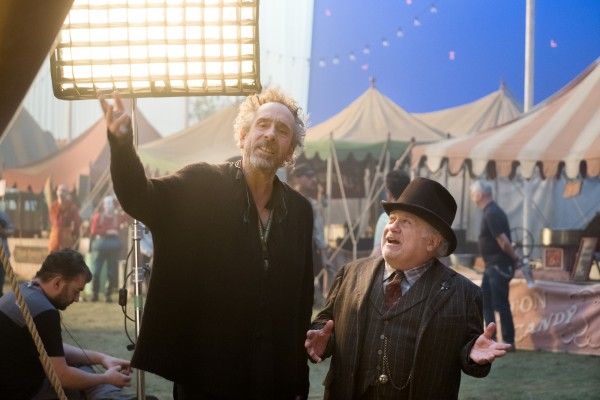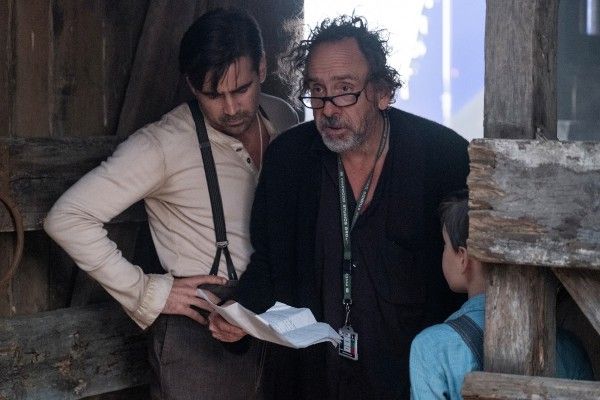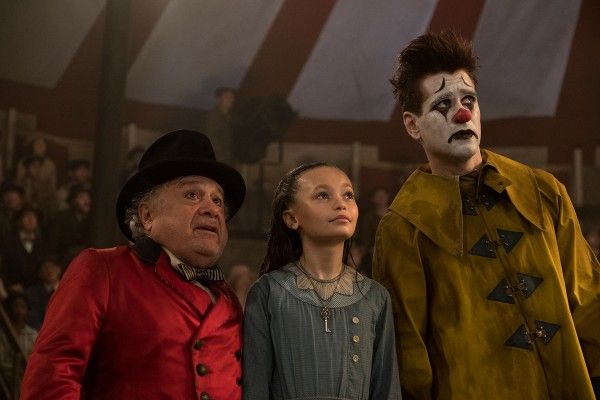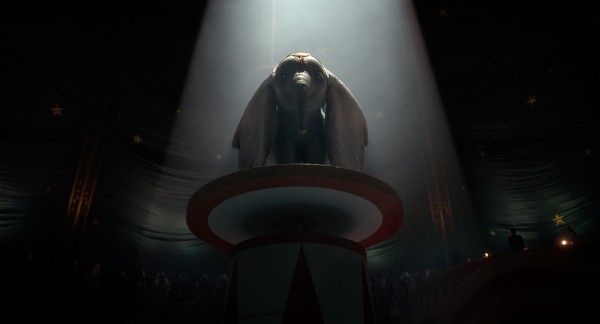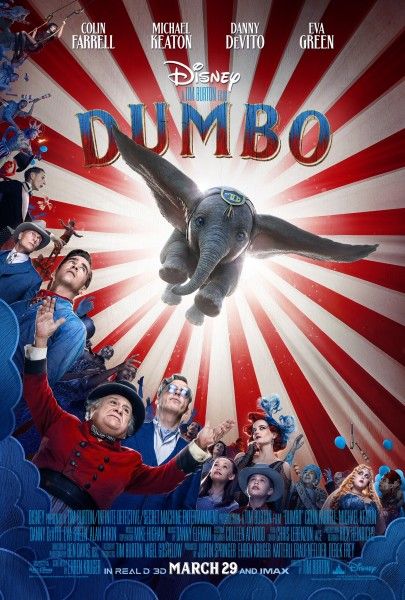From visionary director Tim Burton, the live-action telling of the beloved classic Dumbo celebrates differences while also exploring the importance of family, both by blood and by circumstance. When circus owner Max Medici (Danny DeVito) appoints former horse-riding star Holt Farrier (Colin Farrell) and his children (Nico Parker, Finley Hobbins) as the caretakers for the newborn elephant with the oversized ears, he has no idea that what initially makes him a laughingstock to audiences will also change their lives forever.
While at the film’s Los Angeles press day, music composer Danny Elfman spoke 1-on-1 to Collider for this interview about his reaction to getting a call from Tim Burton to score Dumbo, what he remembered about the original animated film, why working with Tim Burton is different from working with other directors, how quickly he wrote the film’s theme, why he also wanted to do the circus music, how he views his relationship with the filmmaker, the evolution of their long-time collaboration, and how he wants to grow and learn more on every project.
Collider: When Dumbo came your way, what was your initial reaction? Was it an immediate yes, or did you need some time to think about it? Did you want to go back and watch the original animated feature again first?
DANNY ELFMAN: I was surprised, but not surprised. I was like, “Really? Dumbo? Okay, great.” So, my first reaction was surprise, but then, “Sure, why not?” With (director) Tim [Burton], I never know what he’s gonna do next. But then, I watched the movie, which I’d never actually seen, top to bottom, before. I have these memories of bits, like I knew Pink Elephants on Parade. For whatever reason, that was in my memory. And I also knew that Dumbo gets taken from his mom and it’s sad, so that part of it already made me happy because sad makes me happy, musically. The sadder it gets, the happier I get when I’m writing the music, so I was excited.
What point in the process was Tim Burton when he asked you to do this? Did he have a pretty good sense of what he was doing with the film?
ELFMAN: Yeah, he had a pretty good sense of what he was doing, but he didn’t have a good sense yet of the music. He usually evolves that, over the process. It all starts with a thing called the spotting session, where you sit down and go over the whole movie, and every cue gets a number and a name and a little bit about the cue. With Tim, it’s the fastest spotting sessions, in my life. I just finished spotting a new movie, where we literally only got through half the movie in a whole day, and had to meet a second day to do the other half. With Tim, if it’s an hour and 45-minute movie, the spotting session will be two hours and 15 minutes. He adds about a half-hour. He doesn’t talk about it. He just says, “Okay, music here, and music here. We’re gonna keep that. We want that to soar. We want that to be sweet.” He doesn’t verbalize, and that’s fine. Really, the more he verbalizes, it’s not gonna really help me. Telling me how he feels will help me, so that’s what he does. He’ll say, “I feel this way about this scene. I feel this way about that scene.” Then, I start writing. And when I’m writing, I’ll write more than one option because I know Tim. If I play three things for him, it’ll help him focus and say, “Oh, no, that’s the wrong way to go. This is the right way to go.” It’s through that kind of experimentation that I help him figure out what he is really looking for, musically, in the film.
Has your process with him always been like that, or has it evolved into being that quick?
ELFMAN: He’s never been verbal about music, and I’ve always just encouraged him, since the beginning, by saying, “Just say what your emotional feeling is about this scene or that scene.” Really, the best way for a composer to understand is to know how a director feels. When a director starts talking musical language, like what kind of music, it’s almost always misleading. There are so many ways to interpret that it’s like talking about abstract art. It’s like saying, “I want you to do this painting. I can’t tell you what it is, but I think I want it to have stripes.” And then, you’re gonna do something and, inevitably, the person is gonna go, “That’s not what I was imagining in my mind.” You can never grasp what’s in somebody’s brain. If they tell you how they feel, you can try different things. In that experimentation, they can go, “That’s what I was thinking,” or “That’s going into a direction that’s not right.” It’s like being in an optometrist’s office, where they say, “Number one or two?” And you say, “Okay, number two.” And then, they say, “Number two or number three?” And you say, “Number three.” Eventually, you get to your prescription. Especially with Tim, it’s often that way with music and trying different ideas, to finally hone in and connect with something.
Which makes sense because the music in this film does bring such emotional responses to it.
ELFMAN: Yeah, and this is also a rare case where I wrote the theme before I saw the movie. Usually, I wait to see it, but this was a weird one. I got the call saying, “Tim is interested in possibility of you doing Dumbo.” I said, “All right, let’s talk,” and I went to work, that night. An hour later, and I already had a thing in my head, so I quickly recorded it and put it away. Almost a year later, I brought it out and thought, “You know, that’s pretty good,” but that’s really rare. In fact, it might even be the first time I’ve done that because I’ve trained myself to not do that, usually. Usually, finding a theme is a whole process for me. One other time, I saw the opening for Mars Attacks!, when Tim showed me just a simple pre-vis version, and I said, “Hold the film!,” I ran out in the lobby of the theater, and I started making all of these notes to myself, for what became the theme. Usually, it’s much harder than that. In this case, I thought about Dumbo, and just thinking about the idea of this baby elephant being taken from his mom, I wrote a theme and, to my surprise, it stuck. It sat there for a year, and I didn’t even remember it, a year later. I wish I did that, all the time.
I also love circus music and the whole vibe of traveling circuses.
ELFMAN: That was also a fun sidebar to the whole score.
Was it fun to do the circus music?
ELFMAN: Yeah. Usually, when it comes to source music, I’m like, “No, find somebody else. I don’t wanna do source.” But in this case, I was like, “Yeah, I wanna do every piece of source. If it’s in the circus, I wanna do it, even if you can barely hear it in the background.” It was totally fun. Making circus music that’s a little weird is what’s fun for me, just throwing it slightly one way or the other.
What’s it like for you to have such a long-time collaboration with someone like Tim Burton, who you did your first score with, and now here you are, all of these years later and still working together?
ELFMAN: I can’t say that it feels weird because that’s all I’ve known in my life. It’s like family, where sometimes we’ve had huge fights and we’ve not spoken to each other for periods of time, and then, like family, you eventually go, “This sucks,” and you come back together again. He’s very much like part of my family, which doesn’t mean that we always get along, but I feel that connection.
Did you know, from the very beginning, that you would have this collaborative relationship with him, or has that surprised you?
ELFMAN: No, when I first met him, I thought he was interested in a song because I wasn’t interested in writing scores. He said, “I don’t know, I think you could do a score.” I said, “Really? From listening to Oingo Boingo, you think I could do a score?! Whatever.” I wrote a piece of music and put it on a cassette. Obviously, we connected over a lot of things. We grew up in L.A. on the same movies. His idol, when I met him, was Vincent Price, and mine was Peter Laurie. That defined our relationship, for the next 34 years, because Vincent Price frequently tortured Peter Laurie, and Peter Laurie was always the one who was internally suffering while Vincent Price was a little more maniacal. I love them both. So, I wrote this piece of music, and the next thing I heard, I got the job. I literally said, “Well, it’s on you now, if I fuck up your film, which I probably will.” I totally expected the score to get thrown out by Warner Bros., and it didn’t. I was amazed!
Did you know then, that you wanted to keep scoring? Did you get the taste for it right away, or did take some more convincing?
ELFMAN: No, I definitely got the taste. I’d never been in front of an orchestra before, and the first session that we did was the bicycle race in Pee-Wee’s Big Adventure. When I was standing next to the orchestra, hearing it, it definitely hit a nerve in me. I was like, “Wow, I’ve never heard anything so big,” and I’d been in a rock band, for years and years, but it wasn’t that loud. Hearing it from my sketch, played back by real instruments, was pretty amazing. I think it got into my blood, right then and there, and I wanted to keep doing it. For 10 years, I tried keeping both careers alive. I tried to do two movies a year, but at least one. The spacing between my work with Tim was that Pee-Wee was one, Beetlejuice was five, and Batman was 10. Tim said, “How are you doing four movies between each of my movies?” I said, “If I don’t, I won’t learn enough to be able to do each of them. Each of your movies are more demanding for me.” Edward Scissorhands was 14. I was really trying to learn. I was eager to learn, in that first decade, even though I was touring and writing for the band. I was hungry. Every film that I did, even if the film didn’t ask for it, I tried to make myself do something that I’d never done before, and that was out of my wheelhouse, musically, so that I could grow and learn more. Otherwise, I wouldn’t have been able to do Batman, unless I’d done those other eight or nine films between Pee-Wee and Batman. I was trying to increase my tool box. It definitely got in my blood.
Dumbo opens in theaters on March 29th.


